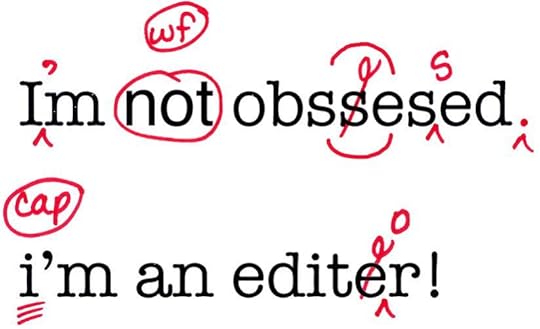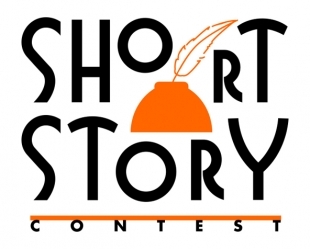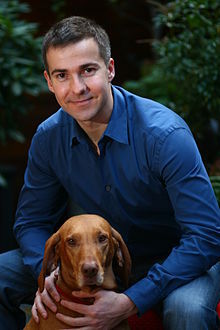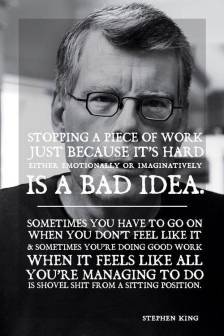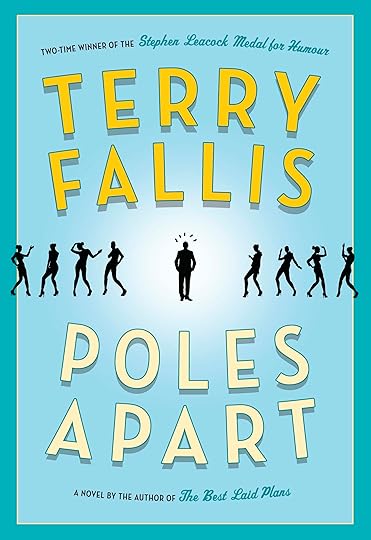Richard Harris's Blog, page 52
February 15, 2016
BlueCat Screenplay Competition
Although the most recent deadline just passed, you might want to consider BlueCat if you have a short or feature film screenplay, especially if you’re loooking for professional feedback. They charge for their services, but they also offer some pretty sweet cash rewards for their competitions.
Click here to visit the contest’s website.


February 13, 2016
In Praise of the Editor
Unequivocally and without a doubt, editors are the unsung heroes of the publishing industry. No matter how much experience you have as a writer, you always need a good (great is better) editor to massage, shape and polish your work of art. In fact, the more you write, the more you realize how much an effective editor is worth their weight in diamond-encrusted gold.
My brother has been my editor and (male) confidante when it comes to the craft of writing for many years. If I have any skillz to pay the billz whatsoever, it’s because of him. He’s the clutch to my stick shift. Wait. That didn’t come out right. He’s the period to my colons. Hmm. That doesn’t sound quite right either.
In any event, a good editor will take a decent piece of writing to another level. Whether you’re Joe No-Name or Michael Ondaatje, you need a talented editor to guide you through the murky waters of everything from diction and punctuation to creativity and structure.
I’ve also been fortunate to work with one of Canada’s most talented editors, Jaclyn Law, who runs a wickedly informative blog called EditFish. She, like my brother, has taught me how valuable an amazing blue-penciler can be.
I believe Malcolm Gladwell would agree with me. The Association of American Publishers (AAP) recently held their annual meeting and Gladwell gave the closing talk, in which he praised the role of editors. However, he expanded the traditional definition of the word “editor.” As Gayle Feldman recently wrote in a piece entitled “Nothing more important than editing“:
Gladwell posited that Steve Jobs was not inventor but “editor,” and for our flood-of-information future, “nothing is more important than this issue of editing. What will sustain this industry is someone to act as gatekeeper and tastemaker. Don’t give me more. Give me less and make it good, and you’ll be in business forever.”
Wise words indeed. All hail the greatness of the editor!


February 10, 2016
Toronto Star Short Story Contest
Do you have a short story under 2,500 words kicking around? Want a shot at $5000? Well, the Toronto Star has a contest just for you. Unlike the CBC short story contest, TorStar’s contest is FREE! And who doesn’t like free (except maniacs and extreme cheapskates, of course)!
As per the the official contest rules:
The contest is open to all residents of Ontario who have attained the age of 16, except for employees, their immediate families and anyone living with any employee of the Sponsor or its corporate affiliates, advertising or promotional agencies. Limit of one entry per person. Contest begins at 9:00 a.m. on Saturday, January 9, 2016. Contest closes at 5:00 p.m., Monday, February 29, 2016. The author’s name should not appear on the story itself. Include your name, address, daytime telephone number and email address along with a 25-50 word biographical sketch on a separate sheet of paper with your entry. Stories must be written in English, original and unpublished up to the time the winners are declared on or about Thursday, April 21, 2016. Stories must be written on a computer or typewriter, be double-spaced and no longer than 2,500 words. Total word count must be printed on the front page of the story. You may wish to enclose a stamped, self-addressed postcard with your entry. Potential winners will be notified by telephone or email on or about Wednesday, April 13, 2016. The winners must agree to allow the Toronto Star to publish their names, photographs and biographical information. The decision of the contest judges is final.
Click here to learn more about the contest and good luck!


November 25, 2015
To Follow Your Dream or Not?
For all those people who’ve grappled with the question of whether to quit their full-time job (i.e. a steady paycheque) and pursue their dream career (i.e. unsteady income), you might want to read an article in today’s Wall Street Journal. There’s a piece about David Ebershoff, the former Random House editor and executive who quit his posh job two weeks ago to become a full-time writer.
To recap: Mr. Ebershoff quit his position as Random House vice president and executive editor. During his time there, he edited literary giants such as Norman Mailer. He was more recently the American editor for David Mitchell. He also has the distinction of editing several (as in more than two!) Pulitzer Prize-winning books, one of which I really enjoyed about North Korea by Adam Johnson called The Orphan Master’s Son.
So why would someone leave this kind of fame, fortune and respect behind him? Obviously it’s not the stellar royalties authors make these days on physical books. Like Andy Weir, David Ebershoff balanced work (he’s also been teaching writing courses at Columbia and NYU) with his love of writing over the years. At some point, one had to give way to the other. Nobody can balance a full-time job with a writing career and expect to stay sane (or at least moderately engaged socially with other human beings).
I applaud David and his strength/bravery/foolishness/romantic nature to follow his passion. Or, as my friend Maria A. likes to say, Follow your bliss! I’ve gotten to know David a little over the last year or so and he strikes me as a bright, intelligent person who has too many literary-related gifts for one person. I also made this fateful decision in 2004 when I gave up a cush lecturing job at a respectable university to pursue writing as a full-time gig. I know how scary it can be and can only hope that David’s journey is as soul-affirming and eye-opening as my own has proven so far.
Even with his hectic schedule over the last few years, David managed to publish two novels (The 19th Wife and Pasadena) and a collection of short stories (The Rose City). His latest novel, The Danish Girl, has recently been made into a major motion picture. Click here to watch the trailer.


November 22, 2015
Thought of the Day: Writer’s Block
I dislike the term “writer’s block.” So does Stephen King. I like this particular quote because it can easily be changed to reflect your day-to-day circumstances: Stopping your life just because it’s hard either emotionally or imaginatively is a bad idea.
November 21, 2015
Genre Snobbery
In an interview with David Barr Kirtley, host of the podcast “Geek’s Guide to the Galaxy,” David Mitchell opened up about a few subjects, including – but not limited to – Ursula K. Le Guin, Dungeons & Dragons, Kazuo Ishiguro’s The Buried Giant, and that very crystalline subject otherwise known as “the future.” As always, Mr. Mitchell has some insightful nuggets of barbecue sauce-laden wisdom to pass on, one of which has to do with the idea of literary genrefication.
I think it fair to say that we as people like to classify, organize, break down, label and basically separate anything and everything into smaller and smaller groups. We do it in the humanities, the arts, and the sciences. It’s meant to help us understand and categorize larger units of information and make it more readily accessible, whether as bits of memory or as books at a library.
Yet David Mitchell takes exception to using labels in the literary world to strictly isolate one branch of writing from another. As the author of little-known works such as Cloud Atlas and The Bone Clocks puts it:
It’s convenient to have a science fiction and fantasy section, it’s convenient to have a mainstream literary fiction section, but these should only be guides, they shouldn’t be demarcated territories where one type of reader belongs and another type of reader does not belong…It’s a bizarre act of self-mutilation to say that ‘I don’t get on with science fiction and fantasy, therefore I’m never going to read any. What a shame. All those great books that you’re cutting yourself off from.
So true. Click here to read the full article on wired.com, entitled, “Genre Snobbery Is a ‘Bizarre Act of Self-Mutilation’.”


November 3, 2015
“My Bad”: Your Bad What? English?
Awww, what would we do without the BBC? Or the Queen for that matter! In an article from bbcamerica.com, Ruth Margolis penned a piece called “10 Common American Expressions That Baffle Brits.” Ha ha ha.
Americans.
Why can’t everyone in the English-speaking world be more like us Canucks, the bisexuals of the English language? We get you, Lance. Pat Pennelegion, you’re spot on. As good-natured, warm-hearted people, we Canadians swing both ways, both shores of the Atlantic, and all without batting an eyelash.
Aside from the title to this post, my favourite Americanism has to be “You do the math.” First of all, I have a soft spot for the phrase. I mean, really, why is it okay to “dot your i’s and cross your t’s,” but not “do the math”? Secondly, I disagree with Ms. Margolis about the pluralization of “maths.” It’s math or mathematics. Choose your pick or pick your choose. Every time I hear someone say “maths,” I want to respond, “Hmm, that’s an interesting point you raise, Ridgewell, but I don’t think mathematic backs that up.” Ha ha ha.
Brits.


Lost in Untranslatability
Many thanks to my friend Michael P. for posting an interesting article from The Independent on one of my favourite subjects, entitled “10 untranslatable words from around the world.” My favourites from the list include the Hindi word viraha (the realization of love through separation), the Indonesian word jayus (a joke so unfunny, you can’t help but laugh…please take note, Mitt Fudgesicle), and the Tamil word oodal (the fake anger lovers display after a fight).
Polyglots – the real cunning linguists of the world – really do have all the fun. As someone who has had the torture-like bliss (is there a word for that in any language? Otherwise please refer to Sexy Mild Genius Girl’s dictionary) of learning Korean for many years, I’d like to add a few more words to the unofficial list of words you should stay away from without flame-retardant attire.
1. 한 (han): Chinese is to Korean much like what Latin and Greek are to modern English. This particular han (there are numerous meanings to the exact same Korean word) is derived from the Chinese character 恨 , and is commonly translated as “(deep) suffering.” To understand Korea – and Koreans – you have to to live and breathe this word past the literal semantics of it all. Korea is the self-described “shrimp between the whales” (Japan, Russia, China) and the NKOTB who always seems to be attracting trouble (i.e. getting the crap kicked out of it). Whether you’re wondering why so many Korean ballads want to make you slash your wrists, why Korean actors in TV and movie dramas always seem to be on the verge of portending the end of the world, or why one must drink copious amounts of soju and other assorted alcoholic drinks on a regular basis, it all comes down to han. And because you’re not an ethnic Korean who has lived your whole life in Korea, you will never truly understand the concept. Or so I’m told.
2) 왕따 (wang-dda): Interestingly enough, we have the word “bully” in English, but no specific word for “one who is bullied.” Korean is the exact opposite. Usually translated as “outcast,” it’s so much more than that. It’s the loner, the loser, the one not accepted and tormented for being short or fat or unable to eat truckloads of kimchi at one sitting or the loooooooooooooooser from Honam (the southwest provinces of South Korea). Wait, I’m from the southwest of Korea!
3) 촌뜨기 (chon-dde-gi): This is a personal favourite of mine from my Mokpo days, when my buddy Albert L. would often act like a toolbox after imbibing one too many poktanju “bombs.” The dictionary defines it as “hillbilly/yokel/hayseed,” but it’s way cooler/crueller than that. Just ask Albert L.
4) 밥 (bap): “Rice” (literally) has to be the most versatile, most wickedest word in the Korean language. Bap is the word you use for cooked rice (as opposed to the numerous other nouns which exist in Korean for rice depending on its stage of growth/function), but it’s also used in myriad phrases that help give life to some awesome phrases, including, but not limited to:
밥 먹었어? Did you eat rice? (How are you?/How’s it going?)
말밥이지! It’s horse rice! (Of course!/For sure!)
콩밥 먹을래? Ya wanna eat rice with beans? (You lookin’ to go to jail?)
The lesson here is clear: Languages are cool; not all words can be translated; and there should be a hall of fame for people who can speak Korean.


November 2, 2015
Poles Apart by Terry Fallis
Congrats to Terry Fallis, author of the 2008 Stephen Leacock Medal for Humour for The Best Laid Plans, and the news that his fifth novel, Poles Apart, rose to #1 on BookManager’s Canadian Bestsellers List as of November 1, 2015. Good on ya, Terry!


November 1, 2015
ScreenCraft’s Short Story & Screenplay Contest
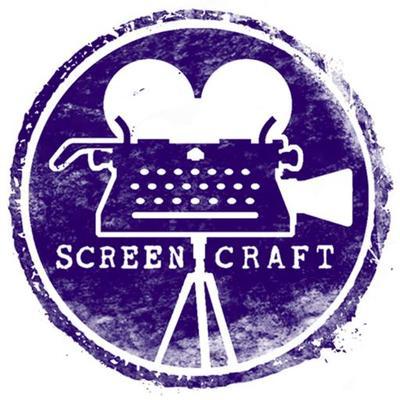
ScreenCraft wants you. Assuming you have talent, that is. What is ScreenCraft? Who is ScreenCraft? As per their website:
ScreenCraft is dedicated to helping screenwriters and filmmakers succeed. It was founded in 2012 as an independent script development consultancy, servicing independent producers and distributors by evaluating and developing projects for production and acquisition.
They’ve been running several contests revolving around short stories and film/TV/short film scripts for a few years now, with rolling deadlines throughout the year, cash awards, and the chance to meet high-profile bigshots in the industry.
Click here to see the 9 categories you can enter, with the Screenplay Fellowship and Short Story Contest now accepting submissions until December 10 and 19, respectively. Any questions for them, click here.




